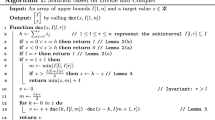Abstract
The concept of p-ordering for a prime p was introduced by Manjul Bhargava (in his PhD thesis) to develop a generalized factorial function over an arbitrary subset of integers. This notion of p-ordering provides a representation of polynomials modulo prime powers, and has been used to prove properties of roots sets modulo prime powers. We focus on the complexity of finding a p-ordering given a prime p, an exponent k and a subset of integers modulo \(p^k\).
Our first algorithm gives a p-ordering for a set of size n in time \(\widetilde{\mathcal {O}}(nk\log p)\), where set is considered modulo \(p^k\). The subsets modulo \(p^k\) can be represented concisely using the notion of representative roots (Panayi, PhD Thesis, 1995; Dwivedi et al., ISSAC, 2019); a natural question is, can we find a p-ordering more efficiently given this succinct representation. Our second algorithm achieves precisely that, we give a p-ordering in time \(\widetilde{\mathcal {O}}(d^2k\log p + nk \log p + nd)\), where d is the size of the succinct representation and n is the required length of the p-ordering. Another contribution is to compute the structure of roots sets for prime powers \(p^k\), when k is small. The number of root sets have been given before (Dearden and Metzger, Eur. J. Comb., 1997; Maulick, J. Comb. Theory, Ser. A, 2001), we explicitly describe all the root sets for \(k\le 4\).
The full version is available at https://arxiv.org/abs/2011.10978.
Access this chapter
Tax calculation will be finalised at checkout
Purchases are for personal use only
Similar content being viewed by others
References
Adleman, L., Lenstra, H.: Finding irreducible polynomials over finite fields. In: Proceedings of 18th Annual ACM Symposium on Theory of Computing (STOC), pp. 350–355 (1986). https://doi.org/10.1145/12130.12166
Agrawal, M., Kayal, N., Saxena, N.: Primes is in p. Ann. Math. 781–793 (2004)
Berlekamp, E.: Factoring polynomials over large finite fields. Math. Comput. 24, 713–735 (1970). https://doi.org/10.1090/S0025-5718-1970-0276200-X
Berthomieu, J., Lecerf, G., Quintin, G.: Polynomial root finding over local rings and application to error correcting codes. Appl. Algebra Eng. Commun. Comput. 24(6), 413–443 (2013). https://doi.org/10.1007/s00200-013-0200-5
Bhargava, M.: P-orderings and polynomial functions on arbitrary subsets of dedekind rings. Journal Fur Die Reine Und Angewandte Mathematik - J. REINE ANGEW Math. 101–128 (1997). https://doi.org/10.1515/crll.1997.490.101
Bhargava, M.: The factorial function and generalizations. Am. Math. Mon. 107 (2000). https://doi.org/10.2307/2695734
Bhargava, M.: On \(p\)-orderings, rings of integer values functions, and ultrametric analysis. J. Am. Math. Soc. 22(4), 963–993 (2009)
Bose, R., Ray-Chaudhuri, D.: On a class of error correcting binary group codes *. Inf. Control 3, 68–79 (1960). https://doi.org/10.1016/S0019-9958(60)90287-4
Cantor, D., Zassenhaus, H.: A new algorithm for factoring polynomials over finite fields. Math. Comput. 36 (1981). https://doi.org/10.2307/2007663
Cheng, Q., Gao, S., Rojas, J.M., Wan, D.: Counting roots for polynomials modulo prime powers. Open Book Ser. 2(1), 191–205 (2019)
Chor, B., Rivest, R.: A knapsack type public key cryptosystem based on arithmetic in finite fields. IEEE Trans. Inf. Theory 34 (2001). https://doi.org/10.1109/18.21214
Dearden, B., Metzger, J.: Roots of polynomials modulo prime powers. Eur. J. Comb. 18, 601–606 (1997). https://doi.org/10.1006/eujc.1996.0124
Dwivedi, A., Mittal, R., Saxena, N.: Efficiently factoring polynomials modulo \(p^4\). In: International Symposium on Symbolic and Algebraic Computation (ISSAC), pp. 139–146 (2019). https://doi.org/10.1145/3326229.3326233
Hocquenghem, A.: Codes correcteurs d’erreurs. Chiffres, Revue de l’Association Française de Calcul 2 (1959)
Johnson, K.: P-orderings of finite subsets of dedekind domains. J. Algebraic Combinatorics 30, 233–253 (2009)
Lenstra, A., Lenstra, H., Lovász, L.: Factoring polynomials with rational coefficients. Mathematische Annalen 261 (1982). https://doi.org/10.1007/BF01457454
Lenstra, H.W.: On the Chor—Rivest knapsack cryptosystem. J. Cryptol. 3(3), 149–155 (1991). https://doi.org/10.1007/BF00196908
Lidl, R., Niederreiter, H.: Finite Fields, vol. 20. Cambridge University Press, Cambridge (1997)
Maulik, D.: Root sets of polynomials modulo prime powers. J. Comb. Theory, Ser. A 93, 125–140 (2001). https://doi.org/10.1006/jcta.2000.3069
Odlyzko, A.M.: Discrete logarithms in finite fields and their cryptographic significance. In: Beth, T., Cot, N., Ingemarsson, I. (eds.) EUROCRYPT 1984. LNCS, vol. 209, pp. 224–314. Springer, Heidelberg (1985). https://doi.org/10.1007/3-540-39757-4_20
Panayi, P.N.: Computation of Leopoldt’s P-adic regulator. Ph.D. thesis, University of East Anglia (1995)
Reed, I., Solomon, G.: Polynomial codes over certain finite fields. J. Soc. Ind. Appl. Math. 8, 300–304 (1960). https://doi.org/10.2307/2098968
Sudan, M.: Decoding reed solomon codes beyond the error-correction bound. J. Complexity 13, 180–193 (1997). https://doi.org/10.1006/jcom.1997.0439
Zassenhaus, H.: On hensel factorization ii. J. Number Theory 1, 291–311 (1969). https://doi.org/10.1016/0022-314X(69)90047-X
Acknowledgements
We would like to thank Naman Jain for helpful discussions. R.M. would like to thank Department of Science and Technology, India for support through grant DST/INSPIRE/04/2014/001799.
Author information
Authors and Affiliations
Corresponding author
Editor information
Editors and Affiliations
Rights and permissions
Copyright information
© 2021 Springer Nature Switzerland AG
About this paper
Cite this paper
Gulati, A., Chakrabarti, S., Mittal, R. (2021). On Algorithms to Find p-ordering. In: Mudgal, A., Subramanian, C.R. (eds) Algorithms and Discrete Applied Mathematics. CALDAM 2021. Lecture Notes in Computer Science(), vol 12601. Springer, Cham. https://doi.org/10.1007/978-3-030-67899-9_27
Download citation
DOI: https://doi.org/10.1007/978-3-030-67899-9_27
Published:
Publisher Name: Springer, Cham
Print ISBN: 978-3-030-67898-2
Online ISBN: 978-3-030-67899-9
eBook Packages: Computer ScienceComputer Science (R0)




